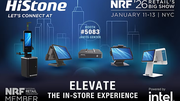Omnichannel
Top 5 retail tech trends shaping 2025
The most impactful retail tech developments this year aren’t flashy upgrades or abstract promises. They’re tools grounded in day-to-day problems: peak-hour chaos, employee safety, hidden losses, and inconsistent decision-making.

October 21, 2025 by Mahdi Hussein — Founder & CEO, SuperSonic POS
Retail technology in 2025 is less about flash and more about function. The newest tools don't just look smart but actually respond to real pressure points inside stores like inventory delays, staffing issues, fraud risks, and safety concerns.
What's emerging isn't tech for the sake of tech. These are systems that are built to support the human running the floor.
This shift doesn't happen overnight. It came from years of frustration with outdated systems that slowed teams down instead of speeding them up.
Founders with firsthand experience in retail are now designing platforms that reflect what it's actually like behind the counter — when lines get long, inventory moves fast, and support can't come later. The result is a new generation of retail tech that prioritizes usability, safety, and real-time responsiveness.
Here are five retail tech trends shaping the way stores work this year, with an eye toward both operational strength and employee support.
1. AI that thinks like a store owner
AI is finally catching up to how real stores operate. Today's retail platforms use artificial intelligence not to overwhelm frontline workers with data, but to give them actionable prompts in the moment.
For example, when inventory is about to run out on a top-selling item or when a prep task needs to be prioritized during a rush, the system automatically flags it. This automation matters most during peak business hours, when decisions can't be delayed. Instead of scanning multiple dashboards, staff get alerts tailored to their exact context — what's moving, what's low, and what needs attention now.
In fast-moving environments like QSRs and convenience stores, it's the difference between reacting late and staying ahead.
2. Embedded safety features in the tools staff already use
Retail safety tools used to be reactive or separate from core systems. In 2025, they're integrated directly into the tools staff already use, such as the point-of-sale system. Panic buttons are now embedded discreetly into touchscreen interfaces, allowing cashiers and clerks to send alerts without escalating tense situations. There's no extra device or obvious trigger — just a seamless part of the screen.
What's more, transactions are increasingly linked to video surveillance, creating a digital trail that can be reviewed instantly. If something happens at the counter, store managers no longer have to dig through hours of footage. The tech ties behavior to visuals in real time, which improves staff protection and streamlines conflict resolution.
3. Fraud detection that supports everyone on the floor
Shrink and loss prevention remain top priorities, but the methods are evolving. Instead of relying on blanket assumptions or end-of-day reports, new systems use AI to flag unusual behavior patterns in real-time. Things like repeated voids, unusual refund patterns, or unexpected use of the 'no sale' button.
What's significant about this shift is that it protects both the business and the employees. Each flagged event is linked to camera footage, adding visual context and reducing the risk of false accusations. For small and mid-sized companies, especially, that level of transparency helps prevent staff turnover caused by distrust or confusion.
4. Adaptive AI that learns each store's rhythm
Generic recommendations don't cut it anymore. The next phase of retail AI is adaptive, designed to learn the unique pace and flow of each individual store. That includes understanding which cashier works most efficiently on Friday nights, or when shelf gaps are likely to appear based on past buying behavior.
This personalization helps store owners become more informed without relying on industry-wide averages. It means staffing, ordering, and scheduling recommendations aren't just smart — they're store-specific. And that local intelligence is crucial for smaller operators who don't have teams of analysts behind them.
5. Collaborative intelligence across retail networks
One of the more practical innovations emerging in 2025 is shared, anonymized data across merchant networks, which allows smaller stores to benefit from broader market trends without sacrificing privacy. For instance, a store's AI can recommend product quantities or flag seasonal demand spikes by analyzing patterns from similar retailers.
This concept, collaborative AI, lets merchants gain insight without having to start from scratch. Instead of building historical data over years or decades, they can tap into relevant trends immediately. It's especially useful for owners just starting out or expanding locations, helping them reduce costly errors and compete more confidently.
What this means for the future
The most impactful retail tech developments this year aren't flashy upgrades or abstract promises. They're tools grounded in day-to-day problems: peak-hour chaos, employee safety, hidden losses, and inconsistent decision-making.
Platforms designed by retail operators for retail operators understand the pain points and strive to provide solutions.
As retail continues to evolve, the systems leading the way won't be the ones chasing trends. They'll be the ones solving problems.
And the real market of progress? Technology that fades into the background — quietly supporting better decisions, stronger teams, and safe stores without getting in the way.
In 2025, the best retail tech doesn't take over. It simply makes the work better.
About Mahdi Hussein
Mahdi is the Founder & CEO of SuperSonic POS, a retail technology platform built by store owners for store owners. With years of hands-on experience running independent retail locations, he focuses on practical, scalable solutions that help small businesses stay competitive in today’s fast-changing market.
 ChatGPT
ChatGPT Grok
Grok Perplexity
Perplexity Claude
Claude




